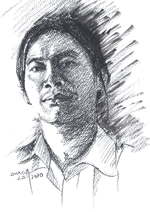
| By AUNG ZAW | Wednesday, June 16, 2010 |
Burma's top military leaders are angry. Despite their best efforts to keep the world's prying eyes out of their affairs, another member of the armed forces has come forward, at great personal risk, to reveal all he knows about the regime's dirty little secrets.
This time, however, the secret was not so little. Sometime earlier this year, Sai Thein Win, a defense engineer and former major in the Burmese military, fled the country with evidence strongly suggesting that the junta is running a nascent nuclear weapons program.
 |
| Aung Zaw is founder and editor of the Irrawaddy magazine. He can be reached at [email protected]. |
It is impossible to overstate the risks that Sai Thein Lwin took to share this information. Just weeks or months before his escape, two other whistle blowers—a former military officer and a foreign affairs official—were sentenced to death in January for leaking reports to the exiled media of a clandestine visit to North Korea by Gen Shwe Mann, the regime's No 3.
Without Sai Thein Win's evidence and the testimony of Aung Lynn Htut, another former army officer featured in a recent documentary shown on the Al Jazeera television network, the world would know little or nothing of what is taking place behind the junta's closed doors.
The regime is, not surprisingly, determined to discredit these two “deserters and fugitives” any way they can.
State-run newspapers called Sai Thein Win a deserter who was fleeing criminal conviction. Maj Aung Lynn Htut, a former intelligence officer who sought asylum in the US after his boss, Gen Khin Nyunt, was ousted in October 2004, was likewise accused of misappropriating US $4,525 in state funds and has been charged with high treason.
Both men would undoubtedly share the fate of their less fortunate colleagues if they were ever to return to Burma. But even though they are now safely outside the country, there are many more mid-ranking officers like them still in Burma, waiting for an opportunity to present evidence of the regime's military connection to North Korea and countless human rights violations.
These would-be informers should be welcomed with open arms by the outside world, but unfortunately, most are still in a limbo, ready to put their necks on the line, but only if they know that the chances they are prepared to take will make a difference.
It remains to be seen whether Sai Thein Win's evidence will move the international community to reassess the situation inside Burma. Meanwhile, his safety is assured, as he is believed to be living in a third country after spending a brief period in Thailand. But his family inside Burma is reportedly facing harassment for his role in revealing the regime's secrets.
In the case of Aung Lynn Htut, matters are somewhat more complicated. Although he now lives in the US, his status there is not permanent. He is required to periodically report to immigration authorities, and there is some concern that he might even be deported, although this seems unlikely. More importantly, however, he must fend off attacks on his credibility by the regime, which has attempted to use diplomatic channels to raise suspicions that he is actually a double agent.
Knowing that they, too, could face such tactics to undermine them even once they are outside the country, most closet dissidents within the ranks of the military are understandably reluctant to make that all-important initial contact with outsiders. Some may even be worried by reports that in the past, some officers who fled to the Thai-Burmese border were executed as alleged spies or informers for the regime.
Defectors provide rare insights into the regime's inner workings, and their courageous attempts to reach out should be recognized and fully supported by those in a position to assist them in any way, including exiles and foreign diplomats. Only by building trust between them and us will we ever be able to challenge the regime's hold on power.